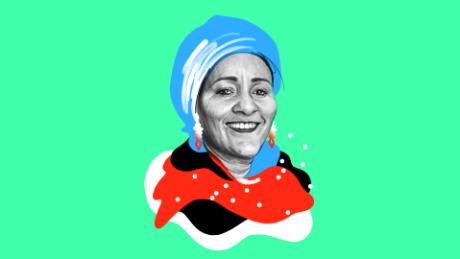It's time for women and girls to speak about their periods
Updated 0430 GMT (1230 HKT) October 3, 2018
CNN is committed to covering gender inequality wherever it occurs in the world. This story is part of As Equals, a year-long series.
Amina J. Mohammed is the Deputy Secretary-General of the United Nations and Nigeria's former Minister of Environment. The opinions expressed in this commentary are hers.
If we are to achieve true gender equality, we need to tackle everything that contributes to the discrimination and marginalization of women -- including menstruation.
While menstruation is the most natural thing in the world, it often keeps girls out of school and the workplace, with devastating consequences that can last generations.
Menstruation is, was or will be a reality for half of the world's population. Yet, it remains a taboo subject with an enormous impact on the life chances of women and girls everywhere.
Women and girls menstruate every month for approximately 35 years -- a total number of days that adds up to around seven years.
For many, that means seven years of anxiety and discomfort because of social stigma. Physical problems are also a major issue -- and a barrier to some women achieving their true potential.
In many countries, girls are kept at home for one week every month because they lack the means to look after themselves during their menstruation.
This puts a brake on their educational achievement, with severe knock-on effects on their ability to contribute to their families and communities and to society as a whole. When menstrual hygiene is properly managed, it contributes to social and economic empowerment and growth, across the board.
First, it helps girls to go to school and opens up all kinds of opportunities from sporting activities to work placements. Second, it contributes to achieving gender equality by enabling girls and women to participate in social, educational and economic activities at the same level as boys and men. Third, managing menstrual hygiene means investing in water infrastructure, which reduces all kinds of health risks.
In developed countries, we take access to affordable menstrual products, accurate information on our menstrual cycles and clean water for granted.
But elsewhere, the absence of these basic necessities means many girls drop out of school during adolescence. This puts them at higher risk of poverty, exploitation and early pregnancy, with all the health risks that involves.
These practical problems are made worse by the stigma that surrounds menstruation. In many parts of the world, menstruation is completely taboo and girls have no idea what is happening to them as their first period begins. For many, this is a terrifying experience.
They may then hear that menstruation is dirty and shameful. They may even be socially stigmatized until their period is over. They may be told to avoid certain foods or certain activities. Not surprisingly, all this contributes to feelings of isolation, low confidence and depression, creating further barriers to girls' well-being.
Roughly half the female population -- around 26 per cent of the global population -- is of reproductive age. Menstruation is the best-kept open secret in the world. For centuries, women and girls have quietly managed their menstruation as best they can, often while fulfilling demanding roles in their families and communities.
It is time women and girls spoke out about their daily struggles. It is time to claim our rights and those of our daughters and granddaughters, to dignity, health, and education.
It is time for the world to step up. Thankfully, we are now beginning to see change.
Educating both girls and boys about menstruation as a normal biological process is the first step. Explaining how their body works builds a girl's confidence and encourages healthy habits. Making sure menstruating girls have access to clean water and sanitation services makes their lives far easier.
Basic public health services can provide support and information on some of the issues associated with menstruation, including premenstrual syndrome, dysmenorrhea and endometriosis. Affordable and environmentally friendly sanitary products can benefit girls and women as well as their communities.
Looking forward, there is room for improvement in both developing and developed countries. Workplace policies can help women manage menstruation in a dignified way; sanitary products may be free or subsidized for those who cannot afford them; new designs are helping to expand choices and decrease environmental pollution.
We must also tackle cultural barriers, and enable menstruating women and girls to participate in all activities of normal life -- from the classroom to the gym class to the workplace to the kitchen or place of worship.
Educating boys while their attitudes and beliefs towards girls and women are evolving is critical. We need to spread the word: menstruation is natural and manageable -- while it may also be painful, uncomfortable, or plain inconvenient.
From Indonesia to Belarus and Kenya, the United Nations is partnering with young people, local communities, schools, governments, influencers and thought leaders to tackle taboos around menstruation and produce innovative solutions.
Managing healthy menstruation is a vital part of the United Nations' efforts to support countries in achieving the 2030 Agenda for Sustainable Development -- our blueprint for peaceful, prosperous societies on a healthy planet. It is an essential step towards gender equality and will contribute to improved education and to water and sanitation services. All of these are important goals in the 2030 Agenda.
Today, some 60 million 10-year-old girls around the world stand at the threshold of adolescence and menstruation. Let's do everything we can to invest in menstrual health and end stigma and discrimination. It is time to lift up the rights of girls and women everywhere.




